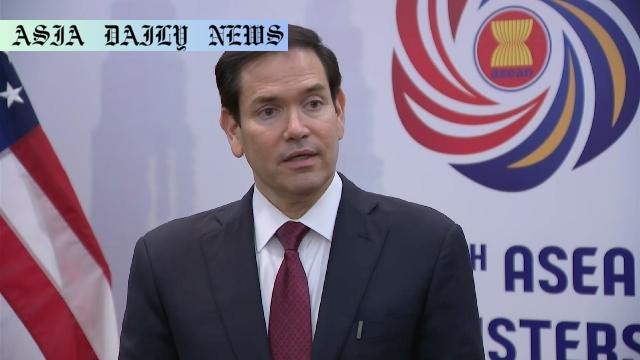Ukraine Ceasefire: Rubio conveys Trump’s frustration over stalled ceasefire talks with Lavrov during ASEAN meeting.
Rubio conveys Trump’s dissatisfaction with the slow progress on Ukraine ceasefire negotiations.
Discussion hints at a new Russian proposal for a ceasefire, but specifics remain undisclosed.
US considers additional sanctions and weapons support for Ukraine to counter intensified Russian aggression.

Introduction: Frustration Surrounding Ukraine Ceasefire Talks
The ongoing conflict in Ukraine remains a contentious international issue, with efforts to establish a ceasefire appearing to stagnate. Recent developments indicate rising tensions as US Secretary of State Marco Rubio expressed President Donald Trump’s frustration over the lack of progress in negotiations with Russia. Meeting with Russian Foreign Minister Sergey Lavrov in Kuala Lumpur during ASEAN foreign ministerial talks, Rubio highlighted the US administration’s concerns, shedding light on the complexities obstructing peace in the region.
The Stalemate: US Concerns and Criticism
During his discussions with Lavrov, Rubio conveyed a sense of urgency and discontent from the White House. President Trump has grown increasingly disappointed over Russia’s lack of flexibility to reach a ceasefire agreement. Despite numerous discussions, both public and behind closed doors, Russia’s intensified military actions have compounded the challenges faced by Ukraine. Civilians are facing escalating hardships while international diplomatic talks remain ineffective in achieving tangible solutions.
Russia’s New Proposal: A Possible Turning Point?
While commenting on the talks, Rubio hinted at Lavrov presenting a new and potentially different approach toward achieving a ceasefire agreement. Although the proposal remains undisclosed, its mere mention showcases a potential shift in Russia’s stance. However, the lack of details raises skepticism regarding its credibility and effectiveness in alleviating the ongoing crisis. The broader international community closely watches for actionable changes in Russian policy.
US Actions: Military Aid and Sanctions
In response to escalating aggression, the Trump administration announced plans to supply additional defensive weapons to Ukraine. This move aligns with its broader strategy of supporting Ukraine while adopting a tougher stance against Russia. Additionally, the US is considering implementing further economic sanctions to pressure Russian leadership into seeking long-term resolutions. However, these actions alone cannot replace the need for a collaborative international effort to broker peace effectively.
Conclusion: Path Forward and Global Implications
The Ukraine-Russia conflict serves as a critical reminder of complexities in modern geopolitics. While Rubio’s statements mark a renewed push from the Trump administration, lasting peace will require multilateral efforts, robust negotiations, and a commitment to humanitarian values. The international community must hold stakeholders accountable and prioritize resolution over prolonged strife.
Commentary
Challenges in Achieving a Ceasefire
The stalled progress in Ukraine’s ceasefire negotiations reflects broader geopolitical tensions that extend beyond the immediate conflict. Russia’s strategic interests and the lack of willingness to compromise underscore the intricate power dynamics at play. While Rubio’s comments highlight the United States’ evident frustration, achieving a comprehensive and lasting agreement depends on the willingness of all parties to genuinely pursue peace. Diplomacy relies not just on words but measurable actions.
US Role and Strategies
The United States, long viewed as a global agent of stability, must balance diplomatic pressure with effective aid strategies. By supplying defensive weapons to Ukraine, the US can help strengthen the country’s resilience. Yet, such moves also risk further antagonizing Russia, potentially escalating tensions. Sanctions, often a favored tool in foreign policy, must be targeted and strategically aligned with broader efforts to achieve consensus between conflicting powers.
The Importance of Global Engagement
A sustainable resolution to the Ukraine crisis will require strong participation from international bodies such as the United Nations and regional coalitions. ASEAN’s involvement, as evidenced by the recent Kuala Lumpur discussions, showcases a collective interest in peacefully addressing global conflicts. Ultimately, addressing such issues holistically ensures both humanitarian and geopolitical concerns are adequately addressed.
Looking Ahead
The current impasse, while disheartening, provides an opportunity for reflection and recalibration. Continued pressure, combined with fresh dialogue tactics, can pave the way for meaningful progress in Ukraine. The world watches with anticipation, hoping that renewed efforts will yield positive outcomes for millions increasingly affected by this protracted conflict.


